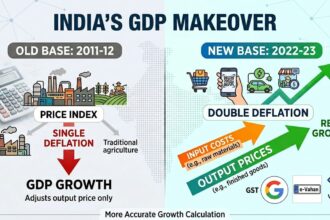In a move that could reshape India’s e-commerce landscape, the government is preparing to roll out new rules that will make it mandatory for online marketplaces—like Amazon, Flipkart, Meesho, Nykaa, and FirstCry—to display a searchable and sortable “Country of Origin” filter for all packaged goods sold on their platforms.
The proposal, part of the Draft Legal Metrology (Packaged Commodities) (Second) Amendment Rules, 2025, was shared by the Department of Consumer Affairs this week. It aims to empower buyers with clearer product information and give domestic manufacturers a much-needed edge in the digital marketplace, where imported products often dominate search results.
For years, online shoppers have struggled to identify whether a product is genuinely Indian-made or imported under vague listings. The new rule would change that. By requiring every e-commerce platform to provide a filter that allows users to sort products based on their country of origin, the government intends to make online shopping more transparent, faster, and fairer.
“This will not only make shopping more transparent but will also reduce the time taken by consumers to identify product details on online platforms,” the Ministry of Consumer Affairs said in its statement.
The draft rules are open for public feedback until November 22. Once notified, the amendment will reinforce the broader goals of the government’s ‘Vocal for Local’ and ‘Atmanirbhar Bharat’ missions, which encourage self-reliance and the promotion of Indian manufacturing.
The regulation also signals a larger trend—stronger oversight over India’s booming e-commerce sector. The government has already been stepping up scrutiny on issues such as deceptive discounts, misleading ads, and vague product disclosures.
The existing Legal Metrology (Packaged Commodities) Rules, 2011, already require brands to disclose details such as manufacturer name, quantity, and maximum retail price. The new amendment deepens that transparency by ensuring that the origin of goods is equally visible.
According to a senior government official, the filter will make platforms more accountable and allow authorities to track compliance digitally. “This step will enable automatic verification of product data, reducing manual checks across thousands of listings,” the official said.
Beyond transparency, the rule could be a game changer for India’s small and medium enterprises (SMEs) and local manufacturers, who often lose visibility to imported goods on digital shelves.
Vinod Kumar, president of the India SME Forum, welcomed the proposal, calling it a long-overdue relief for domestic producers. “For years, small Indian manufacturers have struggled to get fair online visibility. The ‘Country of Origin’ filter could help buyers consciously support Indian brands,” he said.
Kumar explained that the move may also help Indian SMEs use their ‘Made in India’ tag as a competitive edge. “When consumers know where a product is made, they tend to trust it more. This initiative will promote informed buying and help local businesses gain consumer confidence,” he added.
Experts say the government’s draft move aligns India with global norms in e-commerce transparency, echoing measures already practiced in markets like the EU and the US, where product origin disclosure is a standard.
At a time when global supply chains are being tested by trade tensions, particularly between the US and China, India’s push for Swadeshi goods has found new resonance. The latest amendment not only builds on that sentiment but also reflects the Modi government’s continued effort to strengthen India’s position as a trusted manufacturing hub.
The Department of Consumer Affairs has also hinted that this move forms part of a wider consumer protection push. Earlier in July, the government explored revising India’s maximum retail price (MRP) system to make pricing structures more transparent and representative of real production costs.
If the new e-commerce rule is implemented next year, every online click could soon become an informed act of support for Indian enterprise—bringing the ideas of self-reliance and consumer empowerment together on the same screen.









